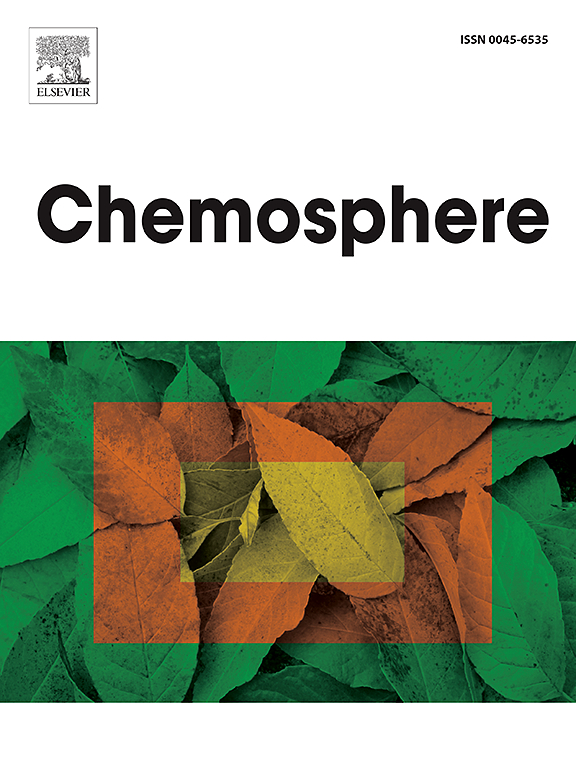斯瓦尔巴群岛康斯峡湾沉积物中 AhR 介导的效力特征:效应定向分析和非目标筛选的应用。
IF 8.1
2区 环境科学与生态学
Q1 ENVIRONMENTAL SCIENCES
引用次数: 0
摘要
在这项研究中,我们采用效应定向分析法,旨在确定北极斯瓦尔巴群岛康斯峡湾表层沉积物(S1-S10,n = 10)中的主要芳基烃受体(AhR)激动剂。根据 H4IIE-luc 生物测定法的评估,位于废弃煤矿区附近的 S2 和 S3 地点的沉积物的中极性馏分和 RP-HPLC 子馏分(F2.6-F2.8;log KOW 5-8)中观察到高 AhR 媒介效力。传统多环芳烃 (t-PAHs)、新兴多环芳烃 (PAHs)、烷基多环芳烃 (alkyl-PAHs) 和苯乙烯低聚物的浓度范围分别为 6.1 至 2100 纳克 g-1 干重 (dw)、0.5 至 1000 纳克 g-1 干重、47 至 79,000 纳克 g-1 干重和 4.2 至 130 纳克 g-1 干重,其中 S2 和 S3 的浓度水平较高。主成分分析和多元线性回归表明,沉积物中的 t-PAHs 主要来源于煤炭、石油燃烧和煤炭燃烧。24 种目标 AhR 激动剂占 S2 和 S3 中 AhR 介导的总效力的 3.2%-100%(平均值 = 47%)。在高效力馏分中通过 GC-QTOFMS 进行非目标筛选,通过四步筛选标准确定了 48 种 AhR 激动剂候选化合物。其中,27 种化合物被鉴定为煤源物质。VirtualToxLab 的硅学建模证实,48 种候选 AhR 激动剂中的大多数都能与 AhR 结合。总之,我们的研究结果表明康斯峡湾沉积物受到了煤炭衍生物质的严重污染,这突出表明有必要开展进一步的研究,以评估与这些污染物相关的生态风险。本文章由计算机程序翻译,如有差异,请以英文原文为准。

Characterization of AhR-mediated potency in sediments from Kongsfjorden, Svalbard: Application of effect-directed analysis and nontarget screening
In this study, we aimed to identify the major aryl hydrocarbon receptor (AhR) agonists in surface sediments (S1–S10, n = 10) from Kongsfjorden, Arctic Svalbard, using effect-directed analysis. High AhR-mediated potencies were observed in the mid-polar fractions and RP-HPLC subfractions (F2.6–F2.8; log KOW 5–8) in the sediments of sites S2 and S3, which are located near abandoned coal mine areas, as assessed by the H4IIE-luc bioassay. The concentrations of traditional polycyclic aromatic hydrocarbon (t-PAHs), emerging PAHs, alkyl-PAHs, and styrene oligomers ranged from 6.1 to 2100 ng g−1 dry weight (dw), 0.5–1000 ng g−1 dw, 47 to 79,000 ng g−1 dw, and 4.2–130 ng g−1 dw, respectively, with elevated levels in S2 and S3. Principal component analysis coupled with multiple linear regression suggested that t-PAHs in sediments primarily originated from coal, petroleum combustion, and coal combustion. Twenty-four target AhR agonists accounted for 3.2%–100% (mean = 47%) of the total AhR-mediated potencies in S2 and S3. Nontarget screening via GC-QTOFMS in the highly potent fractions identified 48 AhR agonist candidates through four-step selection criteria. Among these, 27 compounds were identified as coal-derived substances. VirtualToxLab in silico modeling predicted that most of the 48 tentative AhR agonist candidates could bind to AhR. Overall, our findings indicate significant contamination of the Kongsfjorden sediments by coal-derived substances, highlighting the need for further studies to assess the ecological risks associated with these contaminants.
求助全文
通过发布文献求助,成功后即可免费获取论文全文。
去求助
来源期刊

Chemosphere
环境科学-环境科学
CiteScore
15.80
自引率
8.00%
发文量
4975
审稿时长
3.4 months
期刊介绍:
Chemosphere, being an international multidisciplinary journal, is dedicated to publishing original communications and review articles on chemicals in the environment. The scope covers a wide range of topics, including the identification, quantification, behavior, fate, toxicology, treatment, and remediation of chemicals in the bio-, hydro-, litho-, and atmosphere, ensuring the broad dissemination of research in this field.
 求助内容:
求助内容: 应助结果提醒方式:
应助结果提醒方式:


